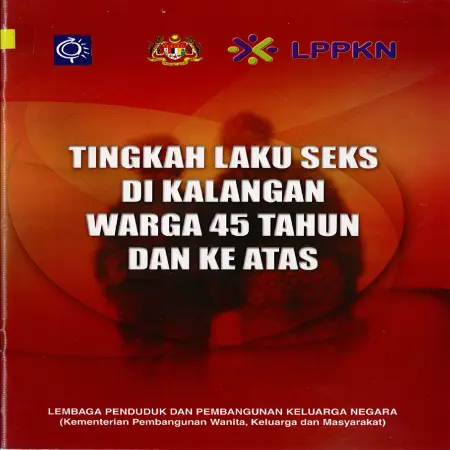| Item type |
Research Report |
| Subjects |
600 Technology > 610 Medicine & health > 613 Personal health & safety |
| Division/Agency |
LPPKN - National Population and Family Development Board, Malaysia: Human Reproductive Division |
| Keywords |
Attitude, Sex, Population, Malaysia |
| Additional Information |
The report can be refer at NPFDB's Resource Centre. |
| Abstract |
An opinion survey on 'Sexual Behavior Among Citizens 45 Years and Above' which was first conducted by the Human Reproduction Division (BRM) was conducted in the Klang Valley area from February to June 2003. The 'Convenience Sampling' sampling method was used where respondents who meet certain criteria fill in the questionnaire themselves. A total of 473 respondents consisting of 50.1% Malays, Indians (26.6%) and Chinese (23.3%) where men (53.5%) outnumber than women (46.5%). The majority of respondents comprised the age group of 50-59 years (41.25%). From the 220 female respondents, only 7.3% took hormone replacement therapy. The results of the study found that the importance and satisfaction of sex decreases with age where it is more pronounced among women than men. The frequency of sexual intercourse is performed in the range of 4-8 times a month (46.3%). Although only 16.7% of respondents had sex-related problems, 70.9% of them did not know the source of help and treatment for their problems. Among those who received treatment, 56.4% chose to seek modern treatment. 55.7% of respondents with sexual problems have at least one chronic disease. A total of 85.6% disagreed and looked for another partner as a way out of sex -related problems. Expectations for better sex in the future are still high at 69.1%. In conclusion, for middle-aged and above despite the declining importance of sexual intercourse, their right to access to knowledge and services related to sexual problems needs to be addressed immediately, especially by medical practitioners, especially the Human Reproduction Division and LPPKN in general. A systematic and ‘gender-sensitive’ approach can help overcome the problem of family institutional breakdown and problems related to incest. |





